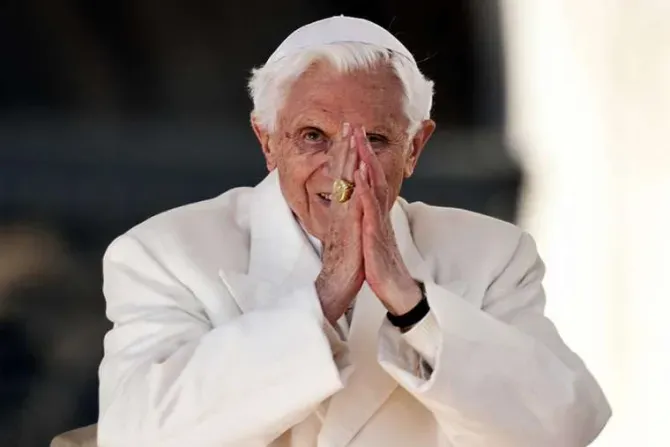Peter Kreeft, a Boston College philosophy professor and author, said he considered Benedict “a shoo-in for saint and eventually a doctor of the Church.”
“Pope Benedict XVI was a gift of God, one of the very best teachers we have ever had, an equal to Gregory the Great, Leo the Great, and Leo XIII,” Kreeft said.
Father D. Vincent Twomey, SVD, said it “will come as no surprise” to him if Benedict XVI is named a doctor of the Church. Twomey, a friend and former doctoral student of the late pope, is a professor emeritus of theology at St. Patrick’s Pontifical University in Maynooth, Ireland.
The late pontiff, Twomey thought, will be remembered “above all for his literary and scholarly output.”
“His writings on a vast spectrum of theological and philosophical topics have a clarity and a depth that make his theology inspiring and therefore liberating,” Twomey said. “Future generations of all walks of life will find inspiration in his homilies and in his pastoral writings as pope; his encyclicals on love and hope must rank among the most outstanding ever to come from the pen of a pope.”
(Story continues below)
For Tracey Rowland, John Paul II Chair of Theology at the University of Notre Dame (Australia), Benedict XVI was “one of the most learned men ever to occupy the Petrine Office.”
“I believe that future generations will honor him with the title of Church Doctor,” she said. “His intellectual legacy is immense and at least on par with St. John Henry Newman, one of the intellectual heroes of his youth.”
“He never lost the faith of his Bavarian boyhood and he defended it intellectually on the stage of the world,” Rowland added. “He understood the theological roots of the cultural crisis of the Western world better than any world leader of his generation.”
Robert Royal, president of the Faith & Reason Institute, also praised the late pope.
“In his brilliance, imagination, humility, and steady faith, he resembled the Church Fathers, whom he loved and studied and brought to bear on our troubled age,” he said. “He belongs in their company and should be named a Doctor of the Church.”
“All of us must die, and the passing of most of us is of little consequence in the vast sweep of sacred history. But Pope Benedict’s death marks the end of a monumental life that changed the Church — and the world — and will continue to do so for many years to come,” Royal said.
These calls to recognize the late pontiff’s contributions echo the words of Cardinal Gerhard Müller, prefect emeritus of the Dicastery for the Doctrine of the Faith. In a Dec. 31 interview with the National Catholic Register, Müller called Benedict XVI a “true doctor of the Church for today” and a “great thinker.”
Tim Gray, president of the Denver-based theology graduate school the Augustine Institute, said Benedict XVI’s ministry complemented that of his friend and predecessor St. John Paul II.
“(H)e showed how the Second Vatican Council faithfully applied the Word of God and the gospel proclamation as the way for us to navigate the crisis of truth we now face,” he said. For Gray, the late pontiff’s writings exemplified the classic Christian description of theology as “faith seeking understanding.”
“He spoke of the hope that challenges us to give up comfort in order to embrace the cross, striving forward for the hope Christ has stored up for us in heaven,” Gray said. “I pray he may now realize the hope he cherished and the hope he challenged the Church to hold to above all others.”
Kevin J. Jones is a senior staff writer with Catholic News Agency. He was a recipient of a 2014 Catholic Relief Services' Egan Journalism Fellowship.








